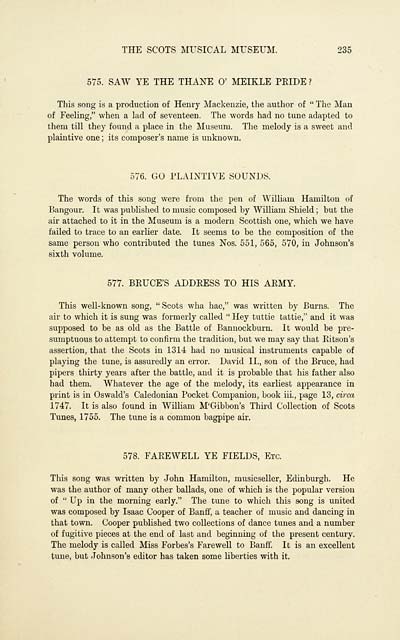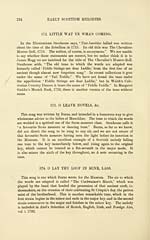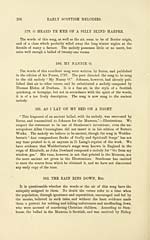Inglis Collection of printed music > Printed text > Early Scottish melodies
(257) Page 235 - Saw ye the thane o' meikle pride
Download files
Complete book:
Individual page:
Thumbnail gallery: Grid view | List view

THE SCOTS MUSICAL MUSEUM. 235
575. SAW YE THE THANE 0' MEIKLE PEIDE ?
This song is a production of Henry Mackenzie, the author of " The Man
of Feeling," when a lad of seventeen. The words had no tune adapted to
them till they found a place in the Museum. The melody is a sweet and
plaintive one ; its composer's name is unknown.
576. GO PLAINTIVE SOUNDS.
The words of this song were from the pen of William Hamilton of
Bangour. It was published to music composed by William Shield ; but the
air attached to it in the Museum is a modern Scottish one, which we have
failed to trace to an earlier date. It seems to be the composition of the
same person who contributed the tunes Nos. 551, 565, 570, in Johnson's
sixth volume.
577. BEUCE'S ADDEESS TO HIS AEMY.
This well-known song, " Scots wha hae," was written by Burns. The
air to which it is sung was formerly called " Hey tuttie tattie," and it was
supposed to be as old as the Battle of Bannockburn. It would be pre-
sumptuous to attempt to confirm the tradition, but we may say that Eitson's
assertion, that the Scots in 1314 had no musical instruments capable of
playing the tune, is assuredly an error. David II., son of the Bruce, had
pipers thirty years after the battle, and it is probable that his father also
had them. Whatever the age of the melody, its earliest appearance in
print is in Oswald's Caledonian Pocket Companion, book iii., page 13, circa
1747. It is also found in William M' Gibbon's Third Collection of Scots
Tunes, 1755. The tune is a common bagpipe air.
578. FAEEWELL YE FIELDS, Etc.
This song was written by John Hamilton, musicseller, Edinburgh. He
was the author of many other ballads, one of which is the popular version
of " Up in the morning early." The tune to which this song is united
was composed by Isaac Cooper of Banff, a teacher of music and dancing in
that town. Cooper published two collections of dance tunes and a number
of fugitive pieces at the end of last and beginning of the present century.
The melody is called Miss Forbes's Farewell to Banff. It is an excellent
tune, but Johnson's editor has taken some liberties with it.
575. SAW YE THE THANE 0' MEIKLE PEIDE ?
This song is a production of Henry Mackenzie, the author of " The Man
of Feeling," when a lad of seventeen. The words had no tune adapted to
them till they found a place in the Museum. The melody is a sweet and
plaintive one ; its composer's name is unknown.
576. GO PLAINTIVE SOUNDS.
The words of this song were from the pen of William Hamilton of
Bangour. It was published to music composed by William Shield ; but the
air attached to it in the Museum is a modern Scottish one, which we have
failed to trace to an earlier date. It seems to be the composition of the
same person who contributed the tunes Nos. 551, 565, 570, in Johnson's
sixth volume.
577. BEUCE'S ADDEESS TO HIS AEMY.
This well-known song, " Scots wha hae," was written by Burns. The
air to which it is sung was formerly called " Hey tuttie tattie," and it was
supposed to be as old as the Battle of Bannockburn. It would be pre-
sumptuous to attempt to confirm the tradition, but we may say that Eitson's
assertion, that the Scots in 1314 had no musical instruments capable of
playing the tune, is assuredly an error. David II., son of the Bruce, had
pipers thirty years after the battle, and it is probable that his father also
had them. Whatever the age of the melody, its earliest appearance in
print is in Oswald's Caledonian Pocket Companion, book iii., page 13, circa
1747. It is also found in William M' Gibbon's Third Collection of Scots
Tunes, 1755. The tune is a common bagpipe air.
578. FAEEWELL YE FIELDS, Etc.
This song was written by John Hamilton, musicseller, Edinburgh. He
was the author of many other ballads, one of which is the popular version
of " Up in the morning early." The tune to which this song is united
was composed by Isaac Cooper of Banff, a teacher of music and dancing in
that town. Cooper published two collections of dance tunes and a number
of fugitive pieces at the end of last and beginning of the present century.
The melody is called Miss Forbes's Farewell to Banff. It is an excellent
tune, but Johnson's editor has taken some liberties with it.
Set display mode to: Large image | Transcription
Images and transcriptions on this page, including medium image downloads, may be used under the Creative Commons Attribution 4.0 International Licence unless otherwise stated. ![]()
| Special collections of printed music > Inglis Collection of printed music > Printed text > Early Scottish melodies > (257) Page 235 - Saw ye the thane o' meikle pride |
|---|
| Permanent URL | https://digital.nls.uk/94646356 |
|---|---|
| Description | Also: Go plaintive sounds. Also: Bruse's address to his army. Also: Farewell ye fields. |
| Description | Scottish and English songs, military music and keyboard music of the 18th and 19th centuries. These items are from the collection of Alexander Wood Inglis of Glencorse (1854 to 1929). Also includes a few manuscripts, some treatises and other books on the subject. |
|---|
| Description | The Glen Collection and the Inglis Collection represent mainly 18th and 19th century Scottish music, including Scottish songs. The collections of Berlioz and Verdi collected by bibliographer Cecil Hopkinson contain contemporary and later editions of the works of the two composers Berlioz and Verdi. |
|---|

